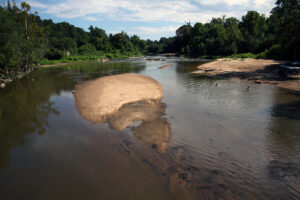News
Black History Month: Bobby Jones Q&A about community activism
Education, Environmental, Sound Rivers
Posted on February 25th, 2021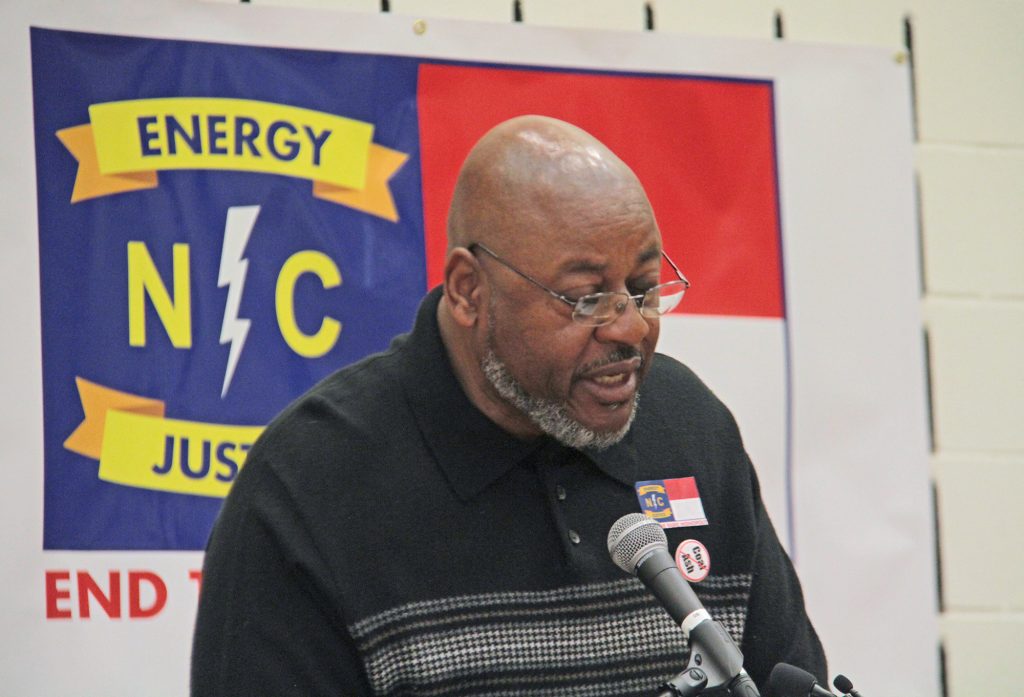

February is Black History Month, a nationwide celebration lifting up the significant roles Black Americans have had in shaping U.S. history. In honor of Black History Month, Sound Rivers is sharing weekly opportunities to learn more about how community activists have shaped, and are shaping, environmental justice in eastern North Carolina.
This week, we’re lifting up an environmental justice activist whose work has had an enormous impact in North Carolina. Bobby Jones, founder of the Down East Coal Ash Environmental and Social Justice Coalition, organized his Goldsboro community to take on the North Carolina Department of Environmental Quality and Duke Energy to make sure the energy giant’s coal ash pits were cleaned up across the state. The coal ash clean-up is the largest in U.S. history and came about through organization of affected communities, joining forces with other environmental groups, lobbying representatives, letter writing and press conferences that brought to light how coal ash was poisoning the North Carolina’s land, waterways and people with heavy metals.
Jones talks about community activism and what he’s experienced during his fight for environmental justice in this Q&A.
Do you feel like community involvement/activism impacts DEQ decisions?
Bobby Jones: One of the major dynamics in interfacing with DEQ is political.
We’re a predominantly red state, and when it comes to DEQ and the big polluters, when it comes to the politicians, a lot of our politicians are literally bought and paid for.
When we first discovered about Duke Energy’s poisonous coal ash, the Governor we had to deal with had been a Duke Energy employee for 29 years. One of the major environmental laws is House Bill 630, and Duke Energy was literally allowed to write that legislation.
Yes, when (community activism is) very strong, and you hit all the political ones, when you show your strength, yes, it does impact decisions. But if it can be bought, we don’t have a fighting chance. DEQ — you would think that the Governor would have a lot of influence, the (DEQ) Secretary would have a lot influence — but the prevailing determinants are the politics.
But we’ve been very successful with organizing and getting organizations across the state to have some impact on those decisions.
What’s the first thing you’d recommend someone do if they’re notified of a DEQ permit and/or upcoming public hearing about an issue that may impact environmental quality in their community?
Bobby Jones: It’s really not a shotgun response. It has to be a multifaceted response. I can’t think of any one thing you can to do that would result in having a favorable outcome.
As a community activist, I would start by alerting my community, organizing my community. In North Carolina, you’ve always got to a have a hand on the political piece, you’ve got to do your math and just see — it depends on what industry, where it’s coming from, who has their hands in it politically.
You have to do local organizing and get involved with other statewide advocacy groups, and you have to get involved in the politics piece.
I’m speaking from experience: every time we had to fight, there was no silver bullet you could shoot if you want to have a favorable outcome.
Are there barriers that prevent community members from getting involved in the DEQ process?
Bobby Jones: Absolutely. First of all, let’s just say the technology divide. You’ve got to understand that eastern North Carolina has dead spots for Wi-Fi, and what is DEQ’s major way of communication? Social media.
A lot of these people can’t afford a smartphone, a laptop, a tablet, and then if they do, there are areas where you have no Wi-Fi. Sometimes, it seems like these polluters, and sometimes DEQ, have taken advantage of that.
You’re poor and disenfranchised? You want a job; you want some income. A lot of times, you might be afraid to raise your voice — you might lose your job; you might lose your home.
What advice would you give to or what experience would you share with someone who wants to participate in environmental justice but has never done so before?
Bobby Jones: I would reach out to other advocacy groups across the state: NC1, Energy Justice NC, Down East Coal Ash Environmental and Social Justice Coalition. Get some education and start organizing your community, and muscle-up. Get ready and be prepared to fight. Build some muscle, and feel out your politicians.
North Carolina was pretty progressive, but North Carolina was a forerunner for the past four years — they provided the model for voter suppression.
The politics are hurting the state and very much hurting us from an environmental justice perspective, because the people in charge are valuing the big businesses over the people. You can be Black, you can be indigenous, you can be poor White — they don’t really care. If you’ve got the money to be a polluter, you can pretty much do what you want in this state.
Do you feel like DEQ could do more to let potentially impacted communities know about how they can get involved?
Bobby Jones: Absolutely. Right now, DEQ’s major means of communicating with people is through social media. Things now don’t appear to be as good as they could be. From my perspective, they don’t realize, it doesn’t appear to be a priority to get impacted communities involved.
I guess you can look at it from their perspective: they have boxes to check off and they do that and they’ve done all they need to do.
When it comes to awareness and getting people involved, I’ve not seen anything beyond a formality. Usually that’s relegated to the organizers, and guess what? You cannot do it on Facebook, because Facebook doesn’t exist for a whole lot of these people.
Some folks are concerned, but a lot of the folks are looking up and when they look up, they see the majority of the legislature is red. As a state, we’ve really got to look at what our majority leadership over the last decade or more, has done to the environment of this state.
Climate change has hit eastern North Carolina hard: every time you look around there’s flooding, buckets of rain. I don’t know what they’re waiting for — I guess as long as money flows, let it roll.
Keep us in your prayers, one thing that eastern North Carolina shows us, is Mother Earth can protect itself if we just let her.
Related News

Neuse fish kill expected to extend beyond holiday weekend
July 3rd 2025
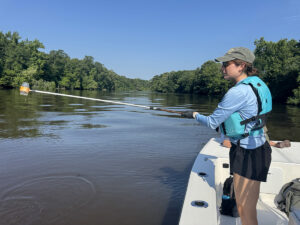
Swim Guide fails prompt Maple Cypress investigation
July 3rd 2025

Riverkeeper, town partners root out source of Smithfield sediment pollution
July 3rd 2025
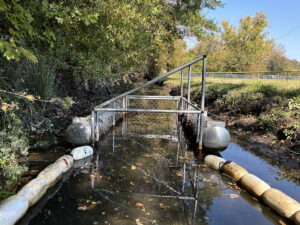
Trash trap No. 12 approved for Smithfield
July 3rd 2025

Sunset River Paddle fundraiser boosts Water Quality Fund
July 3rd 2025

Riverkeepers host quarterly Water Watch meeting
July 3rd 2025
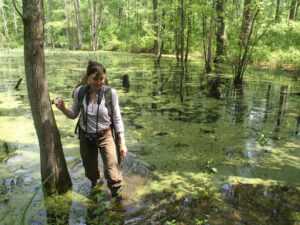
Public hearing will determine the fate of many NC wetlands
June 26th 2025
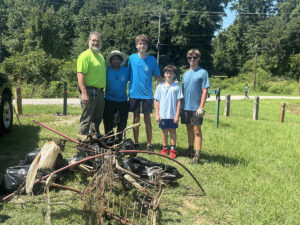
Clayton gets first official trash-trap cleanout
June 25th 2025
